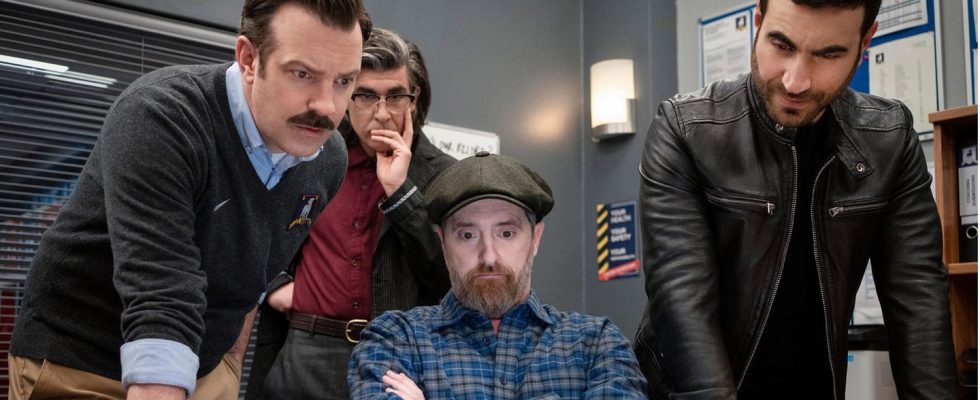The series about coach Ted Lasso and the fortunes of a London football club has long been a favorite of the public and the arts pages. But in season three, the show goes downhill. In any case, our author has had enough of boredom in the locker room.
Maybe it’s this scene that sealed the decline of the cult series “Ted Lasso”: Roy Kent, notoriously bad-tempered ex-soccer professional, takes his little niece to school wearing a T-shirt instead of his usual black outfit Little ones tie-dyed especially for him. Of course, the brightly colored shirt stands for much more than the somehow cute, but nevertheless unpleasant embarrassments that one has to go through in life with children: Roy recognizes in this T-shirt that he has been “trapped” in himself for far too long was stuck in his views and opinions. Now, in the tie-dye look, he suddenly realizes that life is so much more complex than he previously assumed in his hard-hitting black-and-white view of things.
A piece of wisdom just like in the magazines: just wear color and your whole life will appear much happier and more colourful! Roy’s abrupt change of heart, who doesn’t want to fit in with his series career as a grumpy but kind-hearted swear word fan, also helps the TV audience to realize: Actually, you only torment yourself through this series about fate out of habit you have grown fond of a London football club. After season three, “Ted Lasso” should be over anyway – and to be honest, that’s a good thing. What started out as a light-hearted comedy that thrilled audiences and feature pages alike and scooped numerous prizes, including eleven Emmys, is now dragging itself so arduously towards the finale that one only wonders: When will it finally be over?!
Once upon a time, “Ted Lasso” had everything a good series needed
“Ted Lasso” once had everything a series needs, in which even in the binge age you patiently look forward to new episodes every week, which the Apple+ streaming service only publishes gradually. Charming protagonists around the eponymous character of Ted Lasso, an American football coach who, with his unconventional training methods, is supposed to lead the second-class football team AFC Richmond into the Premier League. The “New Meets Old World” culture clash resulted in exactly the right mix of dad jokes, bone-dry British humor and sensitive conversations, which made the clichéd tough male world of football appear astonishingly complex. And then, of course, there was the really heartwarming thing, that which quickly helped “Ted Lasso” achieve cult status: the message that outshines every defeat on the soccer field that with a bit of forbearance and humor you can easily overcome all interpersonal problems.
Only this pleasant feeling of “everything will be fine when we are friends”, the good mood vibe, is no longer enough in season three to overlook the frayed storylines and half-hearted conflict solutions.
Coach Lasso has lost his verve. In his locker room talks, instead of quirky encouragement speeches, you only hear lame phrases (“believe that things can get better”). He only finds inspiration for the game tactics in the mushroom trip, otherwise he mainly mourns his divorced wife and doesn’t notice much. For example, that his player Colin is struggling with the decision of whether to come out. And when the time comes, when Colin reveals himself to his team, his inner struggles are dealt with with a meaningless feel-good saying: “We care about you, very much.”
A player’s “coming out” dissolves into goodwill
That should probably be enough to answer the question of why homosexuality in football will still be an issue in 2023. Just as all the conflicts in the series are suddenly resolved with pleasure: each of the characters seems to be just waiting for the moment when the screenwriters will free them from their tiresome problems. Snap, done!
It was originally the winning strength of the series, effortlessly switching between silliness and serious tones, taking the worries and needs of its characters seriously, but not overusing them – after all, it was still a crisp comedy format. But in the meantime, the storylines of far too many characters meander until you notice: crap, there are only a few episodes left! So the story that started has to be brought to an end holterdiepolter.
In the meantime, there is no plan in the series for so long that it gets hectic. The female protagonists are the most annoyingly affected. Club manager Rebecca first has to fall into a canal in Amsterdam to finally get male attention again. In general, Rebecca only appears in connection with men’s concerns: Although she successfully runs a multi-million dollar company, she feels as intimidated as a small, insecure girl before a meeting with other football managers.
Possibly “Ted Lasso” is simply told
The second lady who really didn’t deserve her fate in “Ted Lasso” is Keeley Jones. The former PR consultant for AFC Richmond and former footballer flame almost gambled away her newly formed girl boss empire by hiring an incompetent old friend and, to make matters worse, struck up a fling with her investor. Of course, women, they just can’t control their feelings in business…
sigh. It all seems as if the production team around Jason Sudeikis, who also plays the title role and is involved in the script, ran out of breath just before the final whistle. Were the expectations of the favorites too high? Perhaps the series is simply told. And maybe that’s the reason why Coach Lasso is withdrawing more and more in the series: his job is done, his protégés and the audience now have to decide for themselves how to proceed for them.
It’s just a shame that the end of this series feels a bit like meeting up with old school friends: it’s nice, but you’re no longer really interested in the stories from the lives of the others. And the fact that you probably won’t see each other again anytime soon is not very sad.


